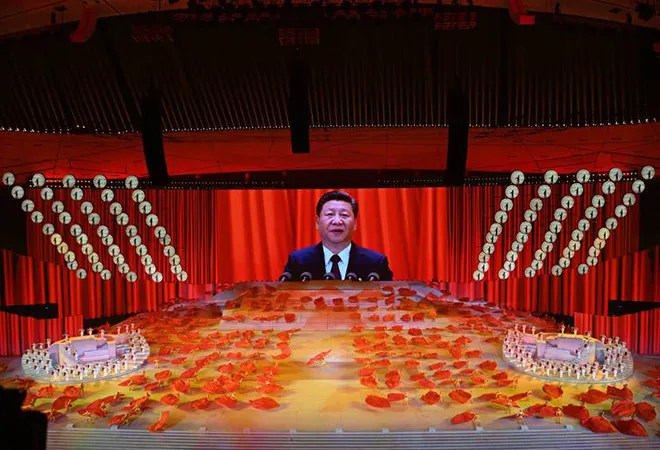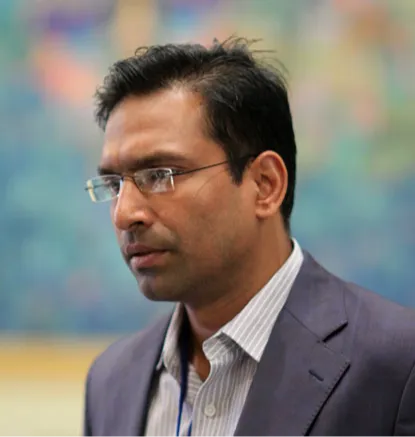-
CENTRES
Progammes & Centres
Location
 This is the 116th article in the series – The China Chronicles.
Read the articles here.
This is the 116th article in the series – The China Chronicles.
Read the articles here.
The Chinese Communist Party (CCP) turned 100 on July 1. The celebration of the centenary event was kickstarted by President Xi Jinping on Thursday. The grand event comprised 70,000 delegates singing, waving and cheering in unison with great fanfare, which symbolised a nation at ease with itself. The massive nation-wide celebration was organised to send a message to the world that the party and the state was strong, unified and resilient. However, a sharp speech from the President where he warned enemy countries of colliding with “Great Wall of steel” in case they attempt to bully China clearly indicates the churns within the mighty nation and the challenges the CCP faces from outside, particularly from the US and other rival nations. While the country has managed the COVID-19 pandemic better than any other large nation in the world and has maintained a high economic growth throughout the pandemic, the regime under Xi has turned brittle and unpopular in many parts of the world, largely because of the manner in which it has handled Hong Kong, the issue of the Uyghurs, and how it has responded to a series of events since the onset of COVID-19 outbreak. Importantly, the CCP’s dubious and suspicious activities via the United Front Work Department (UFWD)—its propaganda arm—has become a major cause of concern in many parts of the world.
Yet, a centenary celebration is not a small achievement. It speaks volumes about the CCP’s capacity to survive, reinvent and stay in power this long. Founded in Shanghai in 1921 by 13 delegates, one of them being Mao Zedong, the CCP, which suffered many setbacks in its early decades leading to its military retreat (called the Long March), eventually defeated the Nationalists and captured power in 1949. However, the bloody struggle that the CCP waged to capture the power stayed with it all along, shaping its policies and outlook at other countries. This followed many catastrophic events such as the Great Leap Forward and the Cultural Revolution, leading to the deaths of millions of Chinese citizens.
The CCP was pragmatic enough to quickly course-correct Mao’s colossal blunders by adopting major reforms in the country and the party. In Deng Xiaoping the CCP found an able leader and a saviour who transformed the country and its economy by embarking on what is now called the “second revolution”
However, the CCP was pragmatic enough to quickly course-correct Mao’s colossal blunders by adopting major reforms in the country and the party. In Deng Xiaoping the CCP found an able leader and a saviour who transformed the country and its economy by embarking on what is now called the “second revolution”. Deng launched a series of economic reforms and trade liberalisation under a ‘state-capitalism model’, which powered China’s unprecedented economic growth, turning an impoverished Asian nation to the world’s second largest economy in less than four decades. The sustained high growth which helped the country to create a massive urban and middle class and aided the country to lift more than 800 million people from poverty greatly enhanced the CCP’s lost legitimacy during Mao era. Yet, during the liberalisation and peak growth period, the Chinese leadership starting from Deng to Hu Jintao, allowed for the CCP and its ideological projects to take a beating as the priorities were growth and redistribution. It was the period that witnessed dilution of ideological rigidity and some political opening, prompting many western analysts to predict the communist country’s eventual transition to democracy.
However, the political liberalisation turned out to be a short affair once Xi took over the mantle as the as the General Secretary of the party in 2012. Since then, Xi has long abandoned the doctrine of Deng Xiaoping—“hide your strength and bide your time”—and has pushed the party and its cadres on a nationalistic course. For example, Xi in 2017 exhorted his people that the time was ripe for China to take global leadership and demonstrate its unique economic model. He said, “a flourishing economic model of socialism with Chinese characteristics offered a new choice for the world.” According to Cai Xia, former professor at the CCP who was in charge of political training when Xi became the General Secretary, the party, which enjoyed some degree of autonomy under previous leaders, has come under the heavy hand of Xi. He has skilfully and assiduously worked to establish himself in the Party history as the third greatest leader after Mao and Deng. One of the ways by which Xi has done this is by eliminating his key rivals. As a testimony to his dominance, in the 19th National Congress of the CCP in 2017, Xi was declared “the most powerful leader since Deng Xiaoping”; and the party enshrined the “Xi Jinping Thought on Socialism with Chinese Characteristics for a New Era”. A major turning point in the transformation of the state was the abolition of the two-term limit in 2018, which allowed for a lifelong presidency.
Thus, Xi has systematically dismantled the collective leadership convention that acted as a sort of restraint on the regimes of both Jiang Zemin and Hu Jintao. Deng’s intent in promoting collective leadership—and concomitantly, separating the party from the government—was to prevent any authoritarian rule as experienced during Mao’s long tenure. Dismantling the established convention, Xi has not only ensured for himself the title of “Core Leader”, he has acquired the titles of party chief, head of the government, and commander-in-chief. Xi has used two key drivers: Hypernationalism and collective anxiety to maintain control over the party and state. The CCP under Xi has also continuously used fear of external threats (i.e., Hong Kong and Xinjiang) or powers envious of Chinese prosperity to target rival power centres as well as exert control over key institutions such as the People’s Liberation Army (PLA). This has resulted in the transformation of the CCP and a greater emphasis on doctrinal Marxism-Leninism, which had lost its shine as China moved towards greater economic liberalisation. Such control has been extended to private firms as well.
Xi has systematically dismantled the collective leadership convention that acted as a sort of restraint on the regimes of both Jiang Zemin and Hu Jintao. Deng’s intent in promoting collective leadership—and concomitantly, separating the party from the government—was to prevent any authoritarian rule as experienced during Mao’s long tenure
While Chinese leadership focussed largely on economic prosperity for decades, this has gone for a huge makeover under Xi. The CCP, under Xi Jinping, has been making determined efforts to spread its influence and is not shying away from interfering in the internal affairs of countries in its near regions and afar. This is being done through a systematic strategy and via multiple pathways. First, even private companies have come under the CCP’s radar as party committee members sit in their decision-making bodies. Importantly, CCP has been empowered in recent years to use enormous amounts of state resources (estimated at US$ 10 billion per year) to continue its influence operations abroad. Second, a significant development under Xi’s tenure is the heightened role of the once marginalised United Front Work Department (UFWD), called ‘Magic Weapon’ by analysts in launching ‘influence operations’ abroad. To intensify these operations abroad, Xi has elevated the United Front to co-opt the Chinese diaspora and build relationships with Western sources so as to ensure the “foreign serve” the CCP well.
In many instances, United Front-funded NGOs have embedded within the Chinese diaspora in the US, Canada, Australia, New Zealand and Europe. Finally, CCP and United Front-connected funding is finding its ways into the realms of ideas production, influencing think tanks and premier universities, NGOs, newspapers and other related media outlets in these regions. The net outcomes of such influence operations by the CCP and United Front are revealing. The most striking cases of Chinese influence operations in recent years were Australia (the buying of influence through political donations), New Zealand and the United States. It became such a problem in the US that it prompted the Trump presidency to launch a series of crackdowns on Confucius centres, accusing them of indulging in ideological indoctrination and espionage. This, together with mega geopolitical projects such as the Belt and Road Initiative, is meant to showcase the party and state’s hard and soft powers in the world.
To sum up, while staying in power over seven decades and powering a once impoverished country to unprecedented prosperity deserves praise and accolades for the pragmatic vision of its past leaders, the CCP under Xi has turned to dogmatism and hyper-nationalism. Its growing authoritarian ambition (reflected in influence operations) and conduct during the initial phases of COVID-19 have raised legitimate concerns not only about the future of the party but also what kind of major power it would become. In short, a successful communist party that transformed a weak and backward-looking country to an economic and technological superpower in a short time has entered into an unchartered territory under Xi.
The views expressed above belong to the author(s). ORF research and analyses now available on Telegram! Click here to access our curated content — blogs, longforms and interviews.

Niranjan Sahoo, PhD, is a Senior Fellow with ORF’s Governance and Politics Initiative. With years of expertise in governance and public policy, he now anchors ...
Read More +